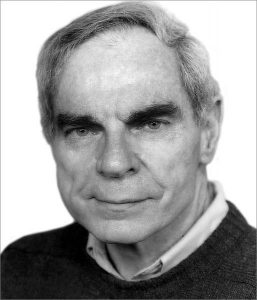
ASOR REMEMBERS PHILIP KING
Philip J. King (1925–2019)
By Joseph A. Greene and Stuart Swiny
Professor Philip J. King, a former president of ASOR, died in Boston, Massachusetts, December 7, 2019, aged 94. He was eulogized by Boston College, where he taught from 1974 to 2001, and by the Roman Catholic Archdiocese of Boston, where he was ordained a priest in 1949. These memorials were devoted to Phil’s priestly life and his academic formation and subsequent career. This remembrance focuses rather on his many years of service to ASOR—not only as president but in other ways besides—as well as his role as mentor, colleague and friend to those who knew him through those years. In this brief tribute we can touch only on the salient points and offer some personal recollections.
Phil’s formal involvement with ASOR began as a member of the Board of Trustees (1973–1990) during which time he became president of the Albright Institute (1972–1976) and then president of ASOR (1976–1982). Before that, he had spent a fellowship year in Jerusalem as an Albright Fellow at what was still the “American School in Jerusalem.” (It became the “Albright Institute of Archaeological Research,” AIAR, only in 1970.) His time in Jerusalem led Phil to a series of archaeological field projects: Tell es-Sa`idiyeh and Tell er-Rumeith in Jordan (1967), Tell Ta`anach in the West Bank (1968), then Gezer and Hesi in Israel (1968–1973). Nancy Lapp, whose late husband Paul directed the Rumeith excavations, first met him there. Much later she recalled using Phil’s handwritten field notebooks while preparing the final Rumeith report with Tristan Barako (Tell er-Rumeith: The Excavations of Paul W. Lapp, 1962 and 1967. ASOR Archaeological Reports 22 [2015]). In 1986 Phil returned to the renamed Albright Institute as an NEH Fellow. In 1989–1990 he was elected Life Member of Clare Hall at the University of Cambridge at the conclusion of a fellowship there.
His academic service was not confined to ASOR. He held the presidency of two other learned societies, the Catholic Biblical Association (1981–1982) and the Society for Biblical Literature (1988), and served on the Board of Governors of the American Research Center in Egypt, ARCE (1982–1985) and the Archaeological Institute of America, AIA (1983–1988).
But it was a ASOR president that Phil made his greatest mark. One instance is emblematic: as ASOR president Phil played a crucial role in the establishment of ASOR’s institute in Nicosia, the Cyprus American Archaeological Research Institute, CAARI. He did much to ensure its financial survival during those difficult early years, at one stage even offering to lend CAARI some of his own money in order to keep it going. Indeed without Phil’s dogged pursuit of funding for CAARI in 1981 and 1982 it might well have closed down. Thanks to Phil’s effort, CAARI survived; and today it thrives as a major force in archaeological and historical research in the eastern Mediterranean.
Stepping down as ASOR president in 1982, Phil turned immediately to researching and writing a chronicle of ASOR first 80 years: American Archaeology in the Mideast: A History of the American Schools of Oriental Research (1983). This remains an indispensable account of ASOR’s founding and early years. Many aspects of it recur prominently in what could be called the Deuteronomistic version of ASOR’s history, An ASOR Mosaic: A Centennial History of the American Schools of Oriental Research, 1900–2000 (ed. Seger, 2001).
It was Phil’s friendship with the late Leon Levy and with Shelby White, a friendship that developed during Phil’s ASOR presidency, that produced, ultimately, the lasting archaeological legacy of the Leon Expedition to Ashkelon, led by Larry Stager, the late Dorot Professor of the Archaeology of Israel at Harvard. This friendship also resulted in 1997 in the creation of the Leon Levy-Shelby White Program for Archaeological Publications, of which Phil King was the founding director. Under Phil’s leadership and under his successor, Professor Christopher Hallett of the University of California, Berkeley, the White-Levy Program has supported the publication of scores of final dig reports, not just in the Near East but globally.
In 2006 the Leon Levy Foundation established with an endowment to Harvard the Philip J. King Professor “to support an outstanding scholar of the ancient world.” In 2010, Dr. Peter Der Manuelian, an Egyptologist, was appointed the first Philip J. King Professor thereby bringing back to Harvard the study of Egyptology after a hiatus of over 70 years.
This incomplete and too brief account can hardly to justice Philip King’s decades-long contributions to ASOR, but we hope we have called attention to the most important of those contributions.
Joseph A. Greene is Deputy Director and Curator of the Semitic Museum of Harvard University. Stuart Swiny directed the Cyprus American Archaeological Research Institute in Nicosia from 1980 to 1995 and then became Professor of Anthropology at the University at Albany–SUNY where he taught until his retirement in 2014.
